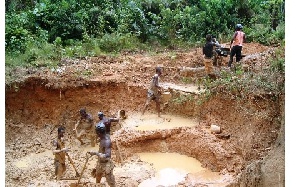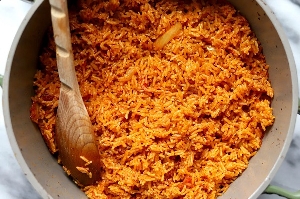- Home - News
- TWI News | TV
- Polls
- Year In Review
- News Archive
- Crime & Punishment
- Politics
- Regional
- Editorial
- Health
- Ghanaians Abroad
- Tabloid
- Africa
- Religion
- Election 2020
- Coronavirus
- News Videos | TV
- Photo Archives
- News Headlines
- Press Release
Business News of Tuesday, 12 March 2013
Source: Daily Guide
We’ll chase out illegal miners – Collins Dauda
The Minister of Water Resources Works and Housing, Alhaji Collins Dauda has emphatically stated that his ministry, in collaboration with the Ghana Water Company Limited (GWCL), will flush out “galamsey” operators, who are polluting water bodies in the country.
“Since water is life, we must make our water bodies safe so the government will do all in its power to flush out ‘galamsey’ operators polluting our water bodies. We shall not allow them to destroy our water bodies while the masses suffer from their illegal activities. Believe me, we will surely chase them out,” he said.
Alhaji Dauda made these remarks at the Daboase In-Take Point facility of GWCL, near Sekondi during a day’s working visit to obtain first-hand knowledge of the problems facing the company and also find ways of resolving them.
At the Daboase In-Take Point facility, an excavator was busily desilting the River Pra, which had been polluted by “galamsey” operators. According to the minister, the desilting work began on March 6, 2013 and GWCL was able to pump 3.8 million gallons of water per day as against the previous output of 2.8 million gallons per day.
He disclosed that the company would continue desilting the river and work on the pumps until it produces five million gallons of water per day as against six million gallons per day when producing at full capacity.
At Bosomase, another In-Take Point for the Company, the minister directed that the excavator should be sent there after completion of work at Daboase to scoop off the silt in order to supply adequate water to its consumers.
He disclosed that due to economic activities and population growth in the Sekonid-Takoradi metropolis, the ministry and the company would embark on some expansion work. “We are preparing to expand the Daboase Water Treatment Plant to produce about 22 million gallons per day so we are seriously looking for investors and partners to fund the project”
Daniel Muomaalah, Western Regional Chief Manager of GWCL, pointed out that the expansion work would include the replacement of pumps with higher capacity to bring more water from treatment.
He said there was no room for expansion at Inchaban though some companies had forwarded proposals to the ministry, adding “Inchaban Treatment Plant is currently producing 1.6 million gallons of water daily, but the expected capacity should be four million gallons per day.”











